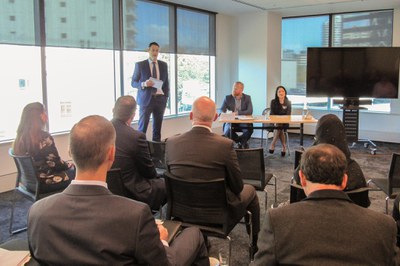Fraud and corruption prevention: Getting it right
 In the 2021 Corruptions Perceptions Index, New Zealand scored 88 out of 100, ranking first equal with Denmark and Finland. Although our public sector is perceived as one of the least corrupt in the world, we cannot take this for granted. The October forum focused on strengthening the public sector's resilience to fraud and corruption, and minimising opportunities and temptations through preventative measures.
In the 2021 Corruptions Perceptions Index, New Zealand scored 88 out of 100, ranking first equal with Denmark and Finland. Although our public sector is perceived as one of the least corrupt in the world, we cannot take this for granted. The October forum focused on strengthening the public sector's resilience to fraud and corruption, and minimising opportunities and temptations through preventative measures.
Detective Inspector Christiaan Barnard (Manager Financial Intelligence Unit, New Zealand Police) was the chairperson for this forum and provided some of his reflections on the topic of fraud and corruption. Christiaan notes that prosecution and investigation play key roles in holding people accountable for fraudulent activities, returning stolen resources, and bringing closure to victims. However, it’s not a sustainable and long-term solution, especially due to limited investigation resources.
Christiaan emphasised that prevention is central to the success of the Anti-Money Laundering and Countering Financing of Terrorism Act 2009. However, he explained the impact and value of prevention is yet to be better understood and quantified. Therefore, unlike prosecution, prevention is not as recognised and visible, and requires further effort.
The main speaker for this forum was Karen Chang (Chief Executive, Serious Fraud Office (SFO), Te Tari Hara Taware). Karen opened the discussion by sharing the priorities and aspirations of the new Counter Fraud Centre (the Centre), as well as the value the service adds to how the public sector perceives and tackles fraud.
In 2020, the SFO was given special funding to prevent fraud of the Covid-19 recovery and relief fund. This work led to the establishment of the Centre, which was officially launched in July 2021.The Centre acts as a first point of contact for assisting and supporting public sector agencies with fraud prevention and anti-corruption capabilities. The Centre currently runs on a voluntary access basis and requires agencies to approach it for expert advice.
This year, the Government agreed to fund the Centre on a permanent basis. Karen noted this was a big milestone, which recognises prevention not just as a useful reactive response to Covid-19-related fraud, but also as its own integral discipline. Karen further explained that it’s important to be the ‘ambulance at the top of the cliff’ as opposed to relying on prosecution, which is usually at the end of the fraud life cycle.
Karen outlined the two main priorities for the Centre. The first is to build capability and resilience in the public sector. The Centre is leading this work by supporting agencies to design their own fraud and risk assessments. The capability across the public sector varies. However, expert advisors can help tailor risk assessments and provide templates as per the nature and size of the organisation. A Counter Fraud Centre Portal has also been established which includes counter fraud and corruption resources for registered members.
The second priority is to shift the culture around fraud. Karen shared that organisations are often reluctant to identify fraud within their organisation due to the negative associations of this subject. However, Karen argues that fraud is covert and, instead of dealing with fraud prosecutions, organisations can prepare by being more proactive and vigilant. Karen emphasised that finding fraud should be perceived positively and needs to be more widely celebrated.
Karen acknowledged that the shift in culture will require effort from people in leadership positions to prioritise and develop capability where needed. This messaging aligns with the Office of the Auditor-General's integrity framework, which highlights that cultural change requires ongoing commitment from leadership teams to influence and increase awareness about good practices in an organisation.
To end, Karen emphasised that we do not need to reinvent the wheel. Countries such as the UK have well-established fraud prevention processes and mandates, which have collected sufficient evidence to demonstrate success. Karen argued that we are in a strong position to implement preventative initiatives through the insights from our counterparts, to strengthen our public sector against fraud.
As I reflected on the topic of this session, I have learnt that realistically fraud is inevitable. While it may be impossible for organisations to eliminate fraud, we have the capability to build a culture that’s more open about fraud prevention. Embedding this culture requires ongoing commitment and effort from leadership roles to ensure that the public's resources are protected against fraudulent activities.
